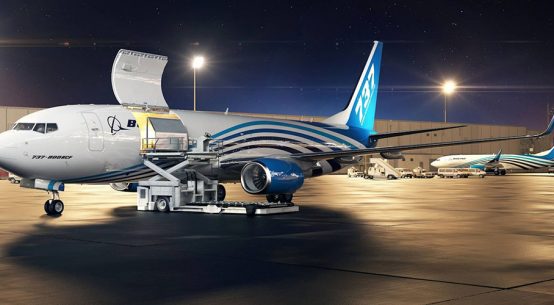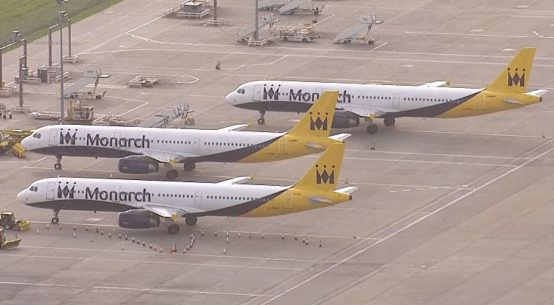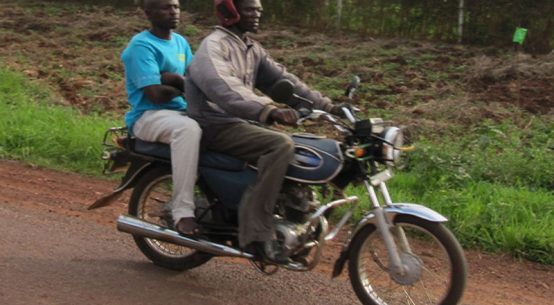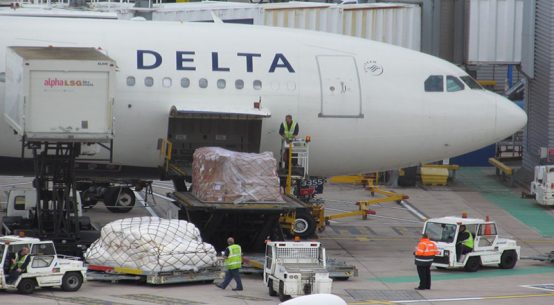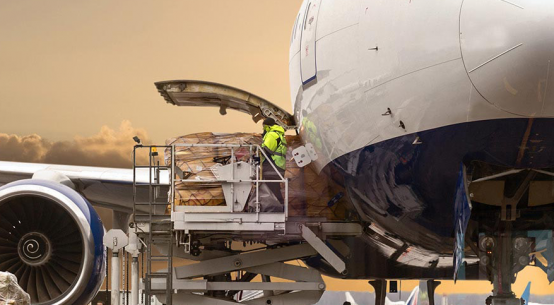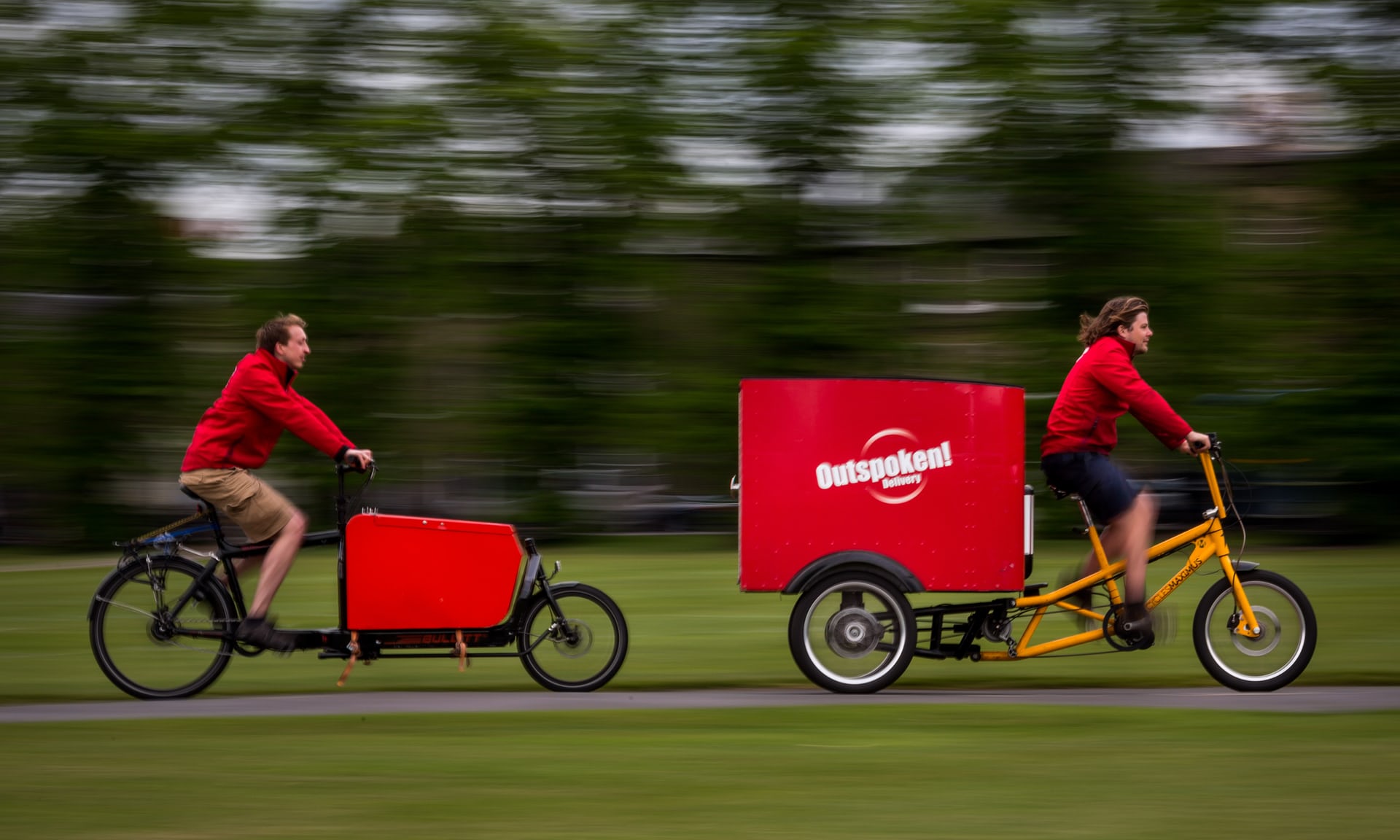
Outspoken Delivery already runs cargo bike operations in Cambridge, Glasgow and Norwich. Photograph: Paul Rogers/Commissioned for The Guardian
Waltham Forest’s new zero-emissions delivery service aims to replace polluting trucks for local deliveries of food, online purchases and more
Each morning Oscar Godoy unlocks a door in a railway arch in north London, organizes the day’s deliveries, and assigns jobs to his cargo bike riders. They manoeuvre the hefty bikes from the narrow lane out on to the road, past assorted vehicles from the MOT garage, the car wash and vehicle repair outfits at either end.
In the afternoons Godoy does the deliveries himself. Two weeks after the scheme’s launch he heads out, on an electric trike with a large white metal box across its rear axle, filled with the day’s first consignment from a local organic vegetable box scheme.
Imagine your ad placed here
This is Waltham Forest’s new council-backed zero-emissions delivery service (ZED). Launched on 28 September, it follows a successful two-week Christmas trial last year, run by the council. Using local cycle instructors and others the scheme delivered on average 43 parcels a day from businesses to residents. Now, Cambridge-based delivery company Outspoken Delivery has two years to turn a profit with it. Until then, a £400,000 grant from the mayor of London’s Air Quality Fund is helping it get off the ground.
Outspoken’s ZED service already delivers library books to the borough’s elderly and vulnerable residents, a part of the job Oscar loves, and 40-50 deliveries of coffee per week from a local roaster, Perky Blenders.
Rob King runs Outspoken and is bullish about the scheme’s chances. “The plan is to win customers,” he says, from both local and national businesses.
“From what we have seen so far, and the interest we have had in the last couple of weeks, we are confident. We have a meeting with TNT, so rather than a 7.5-tonne truck going around the borough they will drop off at our depot, for us to deliver.
“Those trucks aren’t really designed for going around small streets, and we hope to do a lot more of that last mile delivery stuff, goods coming in from outside the borough.”
King notes that local policies, such as blocking rat runs to through traffic as part of the local “Mini-Holland” scheme, and wider policies, make delivery by bike more attractive.
“With London’s healthy streets agenda and low emission zone fees, companies like TNT look to the future and think ‘it’s only going to get harder so let’s look at that process now’.”
Outspoken already runs operations in Cambridge, Glasgow and Norwich, and King hopes to take on more last-mile deliveries nationwide. There are cargo bike delivery schemes in cities around the world, including Gothenburg and San Sebastian. Although Royal Mail deliveries have historically been done by bike, and cargo bike deliveries aren’t particularly new to the UK, they are unusual in outer London and this is believed to be the first such scheme to be supported by a local council.
Elsewhere in London, Pedivan is about to launch a delivery scheme spanning zones 1-3 targeting online deliveries and high street shops, among other things. In Germany, meanwhile, Deutsche Post uses slightly eccentric-looking recumbent quadricycles for some of its deliveries.
Outspoken’s use of the large, three-wheeled Iceni Cycles cargo trike is also unusual – it’s like a small van, with electric assist. The ZED scheme has four assorted bikes in total (three two-wheelers and the trike), two with electric assist, to deliver across a borough that is bigger than Cambridge and surprisingly hilly in places. In time the company hopes to get more electric-assist bikes, and more staff, but in the meantime, today’s test run will see it deliver more than 400 packs of fresh vegetables to 315 homes and local businesses.
The challenge now is to scale up rapidly an operation that took three and a half years to build in Cambridge. It won’t be easy to compete with traditional vans, though. The bikes cost £9,000 each and, unlike motor vehicles, require secure indoor storage against theft.
That’s why the council is helping catalyze that growth. Once it’s big enough, King says, it will become self-sustaining.
Waltham Forest councillor Clyde Loakes says he wants the scheme to become a viable alternative to traditional vans as part of a wider council policy to reduce motor vehicle traffic in the borough while increasing walking and cycling.
“My vision for the scheme is that it becomes a cornerstone of low emissions deliveries within Walthamstow; that we pick up that last mile delivery, so we haven’t got loads of white vans with one parcel in them driving around Waltham Forest and leaving London empty.”
“These bikes are able to get around our network of roads more efficiently than traditional methods of transport, and because it’s locally based perhaps it can respond better to the needs of our residents.”
He envisions people calling a ZED bike from large retail outlets to take their shopping home, rather than driving, and that neighbouring boroughs will get involved.
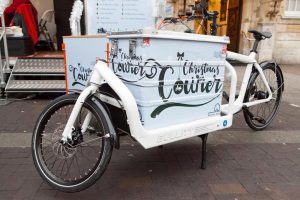
In the meantime, the scheme needs to meet growth projections. “We have got funding to become financially self-sufficient after two years. If it’s working we will start to share that learning as soon as possible and encourage other [boroughs] to follow this course,” says Loakes.
In the meantime, the scheme needs to meet growth projections. “We have got funding to become financially self-sufficient after two years. If it’s working we will start to share that learning as soon as possible and encourage other [boroughs] to follow this course,” says Loakes.
“If we are seriously talking about the state of air quality in London, we have to look at the way deliveries and freight are done. That is a cornerstone of managing our roads more efficiently and effectively, and improving air quality.”
Like King, Loakes sees the nationwide application of the ZED as a realistic prospect.
“There is a model to copy,” he says. “Royal Mail have parcel centres across the country and parcels and letters are sent out from those centres; there is a wide network of those. Clearly, the way people do stuff nowadays has changed: there are a lot more players and online shopping is a lot more significant, compared to last year and five years ago. We have to keep moving forward, and we are taking a low emission approach to that.”
Follow us on TWITTER for more Logistics News Follow us on FACEBOOK for more Logistics News
Laden with boxes of vegetables, Oscar and his bike roll along Lea Bridge Road to a section of the council’s newly-built cycle superhighway that will eventually stretch for almost three miles. At mid-afternoon, the road is already busy with traffic, but at rush hour it can become chocked, which is when this delivery bike – riding comfortably on the new raised cycle track – will come into its own.
Looking forward, it’s easy to picture a future where not just our roads, but our delivery vehicles, are designed in a way sympathetic to, rather than in conflict with, the health of city residents.
Culled from The Guardian



